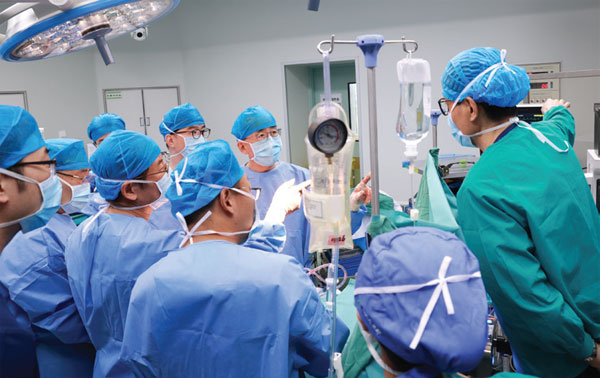HK-Shenzhen pulls off a first under medical connect
The link has opened a new channel for medicines and devices from Hong Kong and Macao to treat patients on the mainland. Chai Hua reports from Shenzhen.
A 9-year-old boy from a small town in Hebei province has been struggling with severe scoliosis for three years. His parents have been to all the major hospitals in Beijing and were told to insert a growth rod into the child's back.
Initially, his mother hesitated as the surgery needs to be repeated every six months, and it would require more than a dozen operations before the boy recovers fully. Each time, her son's back would have to be opened wide up using anaesthesia, causing possible complications.
Scoliosis is a medical condition in which a person's spine has a sideways curve. The abnormality is most common among people aged between 10 and 20. In more severe cases, it can hinder breathing and movement.
Earlier this year, a Beijing doctor told the family that a new treatment requiring a single minimally invasive operation would soon be put into clinical use at the University of Hong Kong-Shenzhen Hospital.
The boy successfully underwent surgery in May. His mother was relieved when she saw how small the surgical wound was. The boy is said to be in a very good condition and has left hospital, walking freely. On the Chinese mainland, there're still tens of thousands of children with the condition.

Hong Kong surgeon Kenneth M.C. Cheung (third from right) performs surgery on May 3, using a magnetically controlled growing titanium rod. [Photo provided to China Daily]
It was the first such operation carried out on the mainland using the first medical device obtained from the launch of the Hong Kong and Macao Medicine and Equipment Connect. The program allows designated mainland hospitals to use Hong Kong-approved drugs and medical devices without prior certification from the National Medical Products Administration.
Mainland patients, including Hong Kong residents living on the mainland, are the main beneficiaries. Medical experts believe the program will elevate Hong Kong's status in the international pharmaceutical industry in terms of academic innovation, new product development and market expansion, as well as the availability of more international medical products.
More importantly, it's an attempt to link up review standards and system for medical products and personnel in the Guangdong-Hong Kong-Macao Greater Bay Area, taking the region closer to being a global healthcare center.
The boy's operation was performed by well-known Hong Kong surgeon Kenneth M.C. Cheung, who had to spend 14 days in quarantine in Shenzhen in April before carrying it out.
Cheung is the first medical expert worldwide to use the magnetically controlled growing titanium rod, and has been performing similar operations for more than a decade. The rod can be stretched outside the patient's body every two to three months after implantation by a magnetic instrument, avoiding further large-scale surgeries.



 Print
Print Mail
Mail